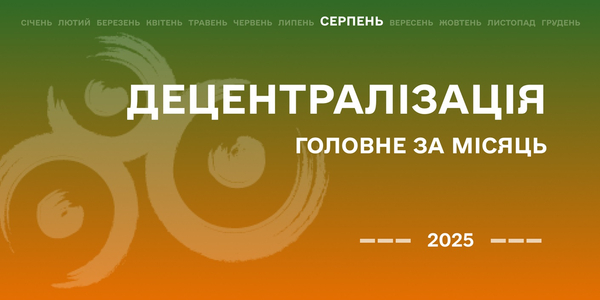Decentralisation. Highlights for August
At the beginning of each month, the Decentralisation.gov.ua portal summarises the results of the previous month. We discuss important Government and Parliamentary resolutions that have been adopted or come into force, and highlight events and discussions that deserve the attention or participation of local governments.
Restoration and support of frontline regions
- The Government adopted a resolution to speed up the restoration of apartment buildings and dormitories damaged as a result of hostilities: inspections, designs, expert assessments, and contractor searches can now take place simultaneously.
- A comprehensive programme has been launched to support frontline regions, including salary increases for teachers, medical workers, and civil servants, housing solutions for families (with the state covering the initial mortgage payment), tax incentives for businesses, and expanded opportunities for reserving employees.
- On 14 August, the Government launched the practical implementation of the Programme to Support Frontline Regions in five areas: security, people, housing, economy, and health.
- On 13 August, the Government approved the distribution of additional subsidies over UAH 1.4 billion to local budgets of de-occupied and affected territories for the second quarter of 2025.
Legislative changes
- On 8 August, Law No. 4321-IX on the use of land for digital infrastructure came into force. The mandatory implementation of spatial development plans has also been postponed until 1 January 2028.
- On 21 August, the Verkhovna Rada adopted the Law ‘On Vocational Education.’ It gives communities more opportunities: financial autonomy for colleges, partnerships with businesses, updated programmes, and independent assessment of knowledge. Investments in workshops, laboratories, and dormitories are also planned.
Government resolutions and strategic documents
- On 13 August, the Government approved the Procedure for the use of the State Regional Development Fund in 2025. These funds will be used to support public investment projects that restore infrastructure and develop regions.
- On 18 August, the Draft Government Action Programme was presented. Six areas have been identified for the Ministry for Development: territorial cohesion, regional recovery, investment, security of supply, infrastructure, and modern transport.
- The Ministry for Development of Communities and Territories of Ukraine has published a draft document entitled ‘Specifics of Implementing the Concept of Reforming Local Self-Government and Territorial Organisation of Power in the Context of Military Challenges and Preparations for Ukraine’s Membership in the European Union.’This document, developed with the assistance of the Council of Europe and after consultations with stakeholders, will determine how to complete the reform in new, challenging conditions.
- The Ministry for Development held consultations with civil society organisations (CSOs) and international partners in preparation for the bilateral screening with the European Commission (EC) scheduled for September (Section 22, ‘Regional Policy’).
- On 27 August, the Government adopted a resolution permitting female local councillors to cross the border during martial law (except for those who receive salaries from the local government).
- At the end of August, the Strategic Investment Council approved the Unified Project Portfolio of Public Investments for 2026. It is based on the Medium-Term Plan for 2026–2028 and will soon be available on the DREAM.
Digitalisation and urban planning
- On 15 August, the Urban Development Cadastre Geoportal (kadastr.gov.ua) was launched – a unified electronic system containing data on urban development documentation for communities.
- The Ministry of Digital Transformation published the updated results of the digitalisation index for regions and territorial communities, based on data collected via the Diia.Digital Community platform.
International cooperation
- Ukraine and Switzerland are strengthening their partnership in reconstruction and development. Following meetings between the two countries, agreements were reached on the implementation of 12 infrastructure, social, and humanitarian projects, worth over CHF 93 million in total. These projects cover areas such as energy, transport, housing for internally displaced persons, education, healthcare, and humanitarian demining. Communities will see the first results as early as autumn 2025.
- The Vinnytsia community, the Vinnytsia Regional Development Agency (RDA) and the Swiss-Ukrainian UCORD project have signed a memorandum outlining plans for the development of the infrastructure of industrial parks. The agreement includes an infrastructure proposal from the RDA, the potential funding of up to CHF 1 million from the UCORD project, and plans for attracting investment and creating jobs.
August showed that, despite the war, work on restoring infrastructure, making strategic decisions, and strengthening educational and digital capacity in communities continued. It is also important that international partners are becoming increasingly involved in local reconstruction and development.
To stay informed, please follow the updates on the Decentralisation portal, our online calendar, and social media accounts on Facebook and Telegram.
All the top news stories from recent months can be found in our previous digests.
Top news from August:
Law enabling communities to use ‘humanitarian’ vehicles for passenger transport comes into force
August that brings new opportunities
Public investment reform: Communities must learn to plan development strategically
Polaris invites communities to partner in implementing a project on mobile public service delivery
Specifics of approaches to regional development in Switzerland (part I)

Tags:
Source:
Портал "Децентралізація"

30 December 2025
Висаджувати десант у майбутнє. Як волонтери...
Україна воює. Відстоює право на існування, захищає кожну вулицю, кожну оселю, кожну громаду. І в цій боротьбі, окрім...
29 December 2025
Громади освоїли понад половину державної субвенції на ремонти місць тимчасового проживання ВПО
Громади освоїли понад половину державної...
Понад 50% коштів державної субвенції на ремонти та переоблаштування місць тимчасового проживання внутрішньо...
29 December 2025
Затверджено 97% місцевих бюджетів: майже всі громади мають фінансову основу на 2026 рік
Затверджено 97% місцевих бюджетів: майже всі...
Станом на 26 грудня 2025 року в Україні затверджено 97% місцевих бюджетів, що створює передумови для стабільного...
26 December 2025
В Україні стартує проєкт «Будинки майбутнього: екологічне модульне житло»
В Україні стартує проєкт «Будинки майбутнього:...
Громадська організація ДЕСПРО долучається до проєкту державно-приватного партнерства «Будинки майбутнього: екологічне...